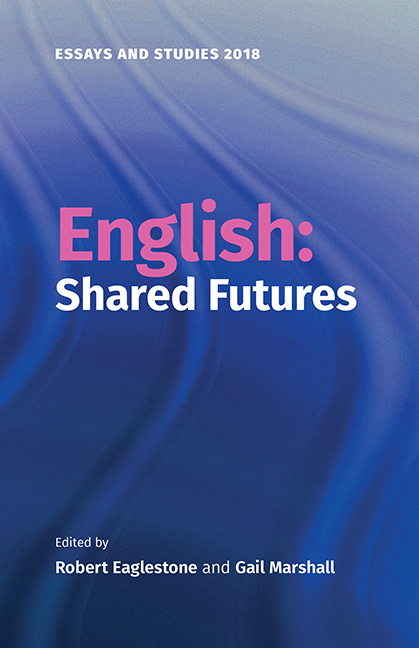Book contents
- Frontmatter
- Contents
- Notes on Contributors
- Acknowledgements
- Abbreviations
- Introduction
- The Changing Picture of School English
- From A-Level to HE: Working Towards a Shared Future?
- English Outreach: Academics in the Classroom
- From Provider to Stager: The Future of Teaching English in HE
- Pedagogic Criticism: An Introduction
- Exquisite Tensions – Narrating the BAME ECA Experience
- Postgraduate Futures: Voices and Views
- Shared Futures: Early Career Academics in English Studies
- Some Reflections on the Funding of English Departments
- English: The Future of Publishing
- Digital Futures
- A View from the United States: The Crisis in the Humanities; the Liberal Arts; and English in the Military Academy
- The Future of Borders
- ‘Between and Across Languages’: Writing in Scotland and Wales
- Exploring Intersections between Creative and Critical Writing: An Interview with Elleke Boehmer
- Integrating English
- Employability in English Studies
- Creative Living: How Creative Writing Courses Help to Prepare for Life-long Careers
- Practice at Large: How Creative Writing can Enhance University Research Environments
- ‘And who can turn away?’ Witnessing a Shared Dystopia
- English and the Public Good
- ‘Can Wisdom be put in a silver rod? / Or Love in a golden bowl?’ On Not Defending the Humanities
- ‘Something Real to Carry Home When Day Is Done’: The Reader in Future
- Afterword
- Index
Postgraduate Futures: Voices and Views
Published online by Cambridge University Press: 15 October 2019
- Frontmatter
- Contents
- Notes on Contributors
- Acknowledgements
- Abbreviations
- Introduction
- The Changing Picture of School English
- From A-Level to HE: Working Towards a Shared Future?
- English Outreach: Academics in the Classroom
- From Provider to Stager: The Future of Teaching English in HE
- Pedagogic Criticism: An Introduction
- Exquisite Tensions – Narrating the BAME ECA Experience
- Postgraduate Futures: Voices and Views
- Shared Futures: Early Career Academics in English Studies
- Some Reflections on the Funding of English Departments
- English: The Future of Publishing
- Digital Futures
- A View from the United States: The Crisis in the Humanities; the Liberal Arts; and English in the Military Academy
- The Future of Borders
- ‘Between and Across Languages’: Writing in Scotland and Wales
- Exploring Intersections between Creative and Critical Writing: An Interview with Elleke Boehmer
- Integrating English
- Employability in English Studies
- Creative Living: How Creative Writing Courses Help to Prepare for Life-long Careers
- Practice at Large: How Creative Writing can Enhance University Research Environments
- ‘And who can turn away?’ Witnessing a Shared Dystopia
- English and the Public Good
- ‘Can Wisdom be put in a silver rod? / Or Love in a golden bowl?’ On Not Defending the Humanities
- ‘Something Real to Carry Home When Day Is Done’: The Reader in Future
- Afterword
- Index
Summary
Clare Lees, Introduction
Postgraduate researchers (PGRs), both collectively and individually, represent one of the most important cohorts in English Studies. It takes a considerable investment of time and intellectual energy to produce research commensurate with a PhD, and that work supports the future of English Studies. The award of the PhD is a remarkable individual achievement that we rarely celebrate collectively as a discipline. As a cohort, postgraduate researchers are supported by their supervisors, academic departments and institutions; they are offered training that is both discipline-specific and that cultivates professional development and wider skills necessary for their future careers. Yet, postgraduates are also precarious. Funding for research is highly competitive and increasingly rare; opportunities to teach, if available, are often provided via shortterm contracts with few benefits and little or no support for research or professional development. That those who represent one significant future for English Studies in its broadest sense experience such precarity is increasingly recognised. The most recent example, perhaps, is the free membership extended by the University and College Union (UCU) to postgraduates on teaching contracts or working within teaching and support (see https://www.ucu.org.uk/free). Research councils such as the AHRC commit funding to postgraduates through a variety of routes such as Doctoral Training Partnerships (DTPs) and also provide opportunities, policy and support for career development. And subject organisations such as the EA and UE consider postgraduate support and development central to our work.
What of postgraduates themselves, however? In what sense are their voices heard whether as individuals or as a cohort similar to that of the ECA? English: Shared Futures (E:SF) provided an opportunity for postgraduates to present their work and for participants to engage with it. Aside from conference participation, however, the voice of the postgraduate researcher is most often heard within professional settings such as the department meeting, the Graduate Centre, College or School, or the research council. Listening to those who represent the various futures of our discipline outside these formal settings, however, is also vital. For this chapter, I invited three researchers, postgraduates or post-PhDs themselves, who had attended the E:SF conference to reflect on their experience in ways that they felt appropriate. I'm grateful to Emily Ennis, Lewi Mondal and Helen Saunders for their willingness to take up my invitation: their voices follow.
- Type
- Chapter
- Information
- English: Shared Futures , pp. 57 - 63Publisher: Boydell & BrewerPrint publication year: 2018

